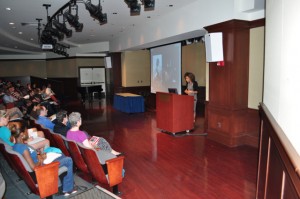It was a rainy Florida evening when George Zimmerman, a volunteer at the neighborhood watch, noticed Trayvon Martin walking to the house of his father’s fiancé. Martin was unarmed, but Zimmerman phoned police anyway.
“This guy looks like he’s up to no good, or he’s on drugs or something,” he said. What happened next would go on to make national news headlines.
After a reported confrontation with Martin, Zimmerman fatally shot the 17-year-old high school student in the chest. Zimmerman would say later that he didn’t suspect Martin to be that young, but rather the same age as him.
To Zimmerman, Martin was not a boy, but an adult, an adult who was not given the same benefit of doubt given to other children.
Cassandra Jackson, English professor at the College, spoke to students at the fo

urth annual Gloria Harper Dickinson Memorial Lecture on Wednesday, April 17. Jackson’s presentation centered on the lack of racial divide that society ascribed to white and black youths.
After the Martin shooting, Jackson wrote an essay for the Huffington Post which discussed the double standard that exists in society.
In New York City, police officers are able to search anyone they deem as looking suspicious under the Stop-and-Frisk policy.
Tyquan Brenon, a high school student from New York City, was searched 60 times before his 18th birthday. The vast majority of people who are pulled over by police are of African American or Hispanic origin. Eighty-eight percent of stop-and-frisk victims are not arrested or ticketed.
“Tyquan was not Tyquan, but rather a powerful idea. A phantom. A phantom criminal that could appear anywhere at any time,” Jackson said.
Such is the case with the Central Park Five, a group of four black teens and one Hispanic teen, who were accused of beating and raping a jogger in Central Park on April 19, 1989. The police had forced a confession out of the boys and they were later convicted.
In 2002, the case was overturned when Matias Reyes confessed to the crime. Officers later identified his DNA as being at the scene of the crime.
“These boys were left to navigate the same waters that had been so treacherous for black men without the benefit of time, experience or wisdom,” Jackson said about black boys who so often get lumped in the same group as black men.
“There’s innocence,” said Steve Demorcy, senior math and secondary education double major, about growing up in Haiti. “You have an area where you’re allowed to be innocent. You’re allowed to make mistakes and not be looked upon as if you’re a black male and it’s expected of you. It’s like you’re a male and it’s expected of you.






